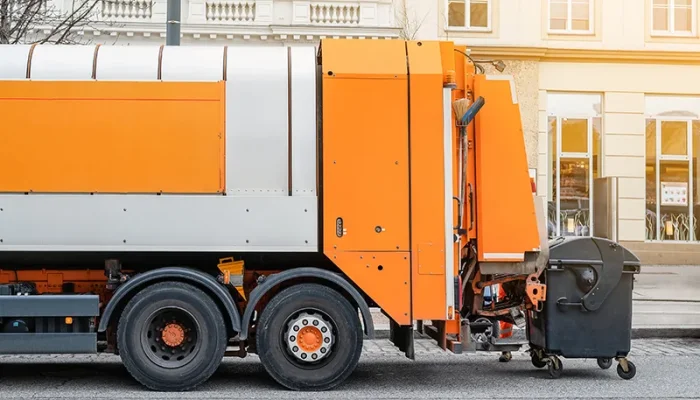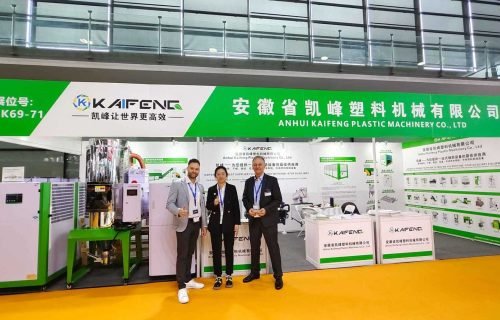Fabrico de borracha e compósitos
Kaifeng é um fabricante profissional de máquinas de plástico que integra a investigação e desenvolvimento, fabrico e venda de máquinas periféricas de plástico.
Requisitos essenciais
1. Consistência do desempenho do material
O controlo preciso das propriedades das matérias-primas é imprescindível. Os compostos de borracha exigem proporções exatas de polímero-enchimento-aditivo para garantir elasticidade, resistência ao rasgo e resistência ao envelhecimento consistentes. Os compósitos requerem interfaces fibra-resina repetíveis para garantir propriedades mecânicas como resistência à tração e resistência ao impacto. A uniformidade entre lotes afeta diretamente a segurança do produto em aplicações críticas (por exemplo, pneus, componentes aeroespaciais).
2. Precisão dos parâmetros do processo
A adesão rigorosa aos parâmetros térmicos e mecânicos define a integridade do produto. A vulcanização da borracha requer um controlo exato da temperatura (±1 °C) e do tempo para alcançar uma reticulação ideal. Os ciclos de cura dos compósitos exigem rampas de temperatura e perfis de pressão precisos para evitar vazios ou delaminação. Os sistemas de monitorização em tempo real são essenciais para manter essas tolerâncias ao longo dos ciclos de produção.
3. Rigor no controlo ambiental
A gestão da humidade e da contaminação é fundamental. Os materiais higroscópicos (por exemplo, borracha com enchimento de sílica, reforços de nylon) requerem pontos de orvalho abaixo de -40 °C durante o processamento para evitar bolhas de vapor ou hidrólise. Salas limpas ou sistemas fechados impedem que contaminantes transportados pelo ar comprometam as ligações adesivas em compósitos ou causem defeitos na superfície da borracha.
4. Práticas de Fabricação Sustentáveis
A eficiência dos recursos e a redução de resíduos impulsionam a viabilidade operacional. A recuperação de energia a partir de reações exotérmicas (por exemplo, cura da borracha), sistemas de refrigeração de água em circuito fechado e utilização de triturados (≥30% em compósitos não críticos) reduzem os custos e, ao mesmo tempo, cumprem as metas ESG. As formulações com baixo teor de COV e os processos sem solventes atendem às regulamentações de emissões.
Ponto de dor

Barreiras à integração da automação
Barreiras à integração da automação
A disposição do reforço e a extrusão do perfil de borracha resistem à automação total. A colocação manual das camadas compostas atinge uma repetibilidade <60%. A elasticidade variável da borracha causa imprecisões no inchaço da matriz durante a extrusão. A adaptação de equipamentos antigos com sensores IoT enfrenta obstáculos de compatibilidade.

Cargas regulatórias de conformidade
As normas em evolução (REACH, limites de COV da EPA) exigem reformulação constante. Aceleradores de borracha como o MBT enfrentam restrições de uso, exigindo sistemas de cura alternativos. As emissões compostas (estireno, acetona) exigem sistemas de captura dispendiosos. A documentação para certificação aeroespacial/médica acrescenta uma sobrecarga de 20–35%.

Inconsistência de materiais e variabilidade de fornecimento
Os lotes de polímeros brutos (borracha natural, resinas) apresentam flutuações nas propriedades devido a variações na origem. Enchimentos como negro de fumo ou sílica requerem um controlo rigoroso da dispersão para evitar a aglomeração. Os reforços compostos (por exemplo, fibras de vidro/carbono) podem sofrer tratamentos de dimensionamento inconsistentes, comprometendo a adesão da resina. Essas inconsistências forçam um reprocessamento dispendioso e desvios de qualidade.

Desafios da gestão térmica
O controlo preciso da reação exotérmica continua a ser problemático. A vulcanização da borracha gera uma distribuição irregular do calor, causando núcleos subcurados ou queimaduras na superfície. A cura de compósitos exige gradientes de temperatura exatos; desvios superiores a ±3 °C provocam encolhimento ou delaminação da resina. O arrefecimento eficiente de moldes grandes aumenta a intensidade energética e penaliza o tempo de ciclo.
Soluções em soluções de processamento de plásticos
Visão geral da solução
A máquina de plástico utiliza tecnologias eficientes de gestão térmica, tais como controlo de temperatura de dupla função e sistemas de recuperação de calor, para alcançar processos de aquecimento e arrefecimento energeticamente eficientes. A monitorização em tempo real e os controladores programáveis garantem a precisão e a estabilidade do processo de produção, enquanto os procedimentos operacionais automatizados reduzem a intervenção humana e melhoram a eficiência da produção.

Detalhes da solução
Gestão térmica otimizada
O controlo de temperatura com dupla função permite transições contínuas entre aquecimento e arrefecimento nos controladores de temperatura do molde. Os sistemas de recuperação de calor nos desumidificadores reutilizam a energia térmica, reduzindo o consumo líquido de energia durante o processamento do material.
Controlo de Processos Estabilizado
A monitorização em tempo real e os controladores programáveis mantêm parâmetros precisos (temperatura, humidade, proporções de mistura). Os sistemas de autodiagnóstico detetam automaticamente anomalias em operações críticas para evitar desvios.
Procedimentos operacionais automatizados
Programas pré-definidos para máquinas de plástico automatizam a medição de materiais e o controlo de humidade. A monitorização remota permite o controlo centralizado do equipamento, enquanto os visores e os sistemas de alarme minimizam a intervenção humana.
Expansão personalizada da escala de produção
O design modular das máquinas para plástico adapta-se a diferentes escalas (desde I&D até produção em grande escala). Os parâmetros configuráveis suportam processos personalizados, como a vulcanização da borracha. O design de engenharia personalizado garante uma integração perfeita dos fluxos de trabalho.
Vantagens da reciclagem e da gestão de resíduos

Serviço global e forte apoio dos clientes
Serviço global e forte apoio dos clientes O nosso equipamento é exportado para mais de 20 países e regiões da Europa, Américas, África e Sudeste Asiático. Com mais de 500 clientes corporativos em todo o mundo e uma taxa de recompra de 85%, construímos uma sólida rede global e uma reputação de confiança na indústria.

Vasta gama de aplicações
Vasta gama de aplicações Os nossos produtos e soluções são amplamente aplicados em diversas indústrias, tais como processamento de plásticos, reciclagem e gestão de resíduos, fabrico de produtos químicos e farmacêuticos, produção de alimentos e bebidas, AVAC e refrigeração, e fabrico de borracha e compósitos - demonstrando uma adaptabilidade excecional.

Cobertura alargada do sector
Temos uma forte presença no sector dos equipamentos auxiliares para plásticos, oferecendo um portfólio completo que abrange a troca de calor e frio, trituração e reciclagem, mistura e dosagem, desumidificação e secagem, bem como sistemas de alimentação e transporte. A nossa vasta gama de produtos foi concebida para satisfazer as exigências das várias fases de produção.

Qualidade consistente e longa vida útil
Operando sob o sistema internacional de gestão da qualidade ISO9001, utilizamos materiais de alta qualidade, tais como lâminas de liga endurecida e motores com núcleo de cobre. Em combinação com equipamento de inspeção avançado, estes asseguram um desempenho estável e prolongam a vida útil do equipamento até 50%.

Preços competitivos e personalização flexível
Preços competitivos e personalização flexível Com foco no valor, nossos produtos têm preços 10%-15% mais baixos do que equipamentos comparáveis, sem comprometer a qualidade. Oferecemos personalização à medida, opções de pagamento flexíveis e garantias a longo prazo para maximizar o retorno do investimento para os nossos clientes.

Investigação e desenvolvimento avançados e conhecimentos técnicos especializados
Investigação e desenvolvimento avançados e conhecimentos técnicos Operamos um centro de investigação e desenvolvimento dedicado e um departamento de tecnologia, equipados com linhas de produção modernas e sistemas de teste avançados. Os nossos engenheiros experientes melhoram constantemente o desempenho dos produtos e desenvolvem novas soluções adaptadas às exigências do mercado.
Tipos de plástico processáveis
PP
PP
PVC
PVC
PE
PE
PC
PC
PS
PS
PET
PET
Obter uma solução personalizada
Como um fabricante profissional de máquinas para plástico, damos as boas-vindas a todos os tipos de consultas.
Contactar-nos
FAQ
Como é que a sua máquina de plástico garante uma mistura consistente do composto de borracha?
Os nossos sistemas de mistura proporcionam um controlo preciso das proporções de enchimento e uma dispersão uniforme – essenciais para obter as propriedades mecânicas necessárias nos produtos de borracha. A dosagem automatizada mantém a consistência entre lotes para uma vulcanização de qualidade.
Que capacidades de controlo de temperatura suportam os processos de cura de compósitos?
Os nossos sistemas de gestão de temperatura proporcionam perfis de aquecimento estáveis, essenciais para a cura adequada da resina em compósitos. O equipamento mantém tolerâncias de temperatura rigorosas durante todo o ciclo de moldagem.
Como o seu equipamento de secagem lida com materiais compostos sensíveis à humidade?
Os sistemas de desumidificação preparam eficazmente os reforços compostos higroscópicos, reduzindo o teor de humidade para níveis ideais antes das operações de moldagem.
A sua máquina de plástico consegue processar borracha reciclada/materiais compostos?
A nossa máquina de plástico de grande porte foi concebida para processar resíduos pós-industriais de borracha e compósitos, produzindo material triturado consistente, adequado para reutilização em processos de fabrico.
Quais características garantem o processamento seguro de formulações de borracha/compósitos?
O equipamento incorpora as proteções necessárias para o manuseamento de vários compostos de borracha e resinas compostas, incluindo ventilação adequada e recursos de contenção de materiais.
Equipamentos obrigatórios

Equipamento de permuta de calor e frio
Controlo da temperatura em processos de moldagem de borracha e compósitos.

Equipamento de mistura e dosagem
Mistura e doseamento das matérias-primas.

A 13ª Conferência Internacional de Tecnologia da Indústria de Bebidas da China...
KAIFENG Plastic Machinery é um profissional de fabrico, produção, venda e serviço como um dos equipamentos auxiliares de plástico e controlo de temperatura industrial. equipamento auxiliar de plástico e controlo de temperatura industrial...

Análise e soluções para problemas comuns de misturadores de plástico por ...
Os misturadores de plástico podem encontrar alguns problemas comuns durante a utilização diária. A Anhui Kaifeng Plastic Machinery Co., Ltd., com anos de experiência no sector, analisará as causas destes problemas e...

CBST 2025 Xangai: Automação em um só lugar da Kaifeng Machinery...
De 5 a 7 de março de 2025, a 13ª Exposição Internacional de Ciência e Tecnologia da Indústria de Bebidas da China (CBST-2025) será inaugurada no Hall N1-N3, Shanghai New International Expo Centre...
